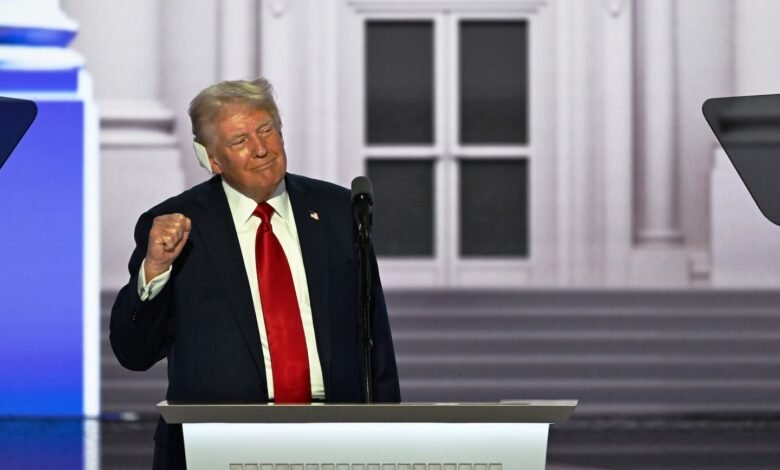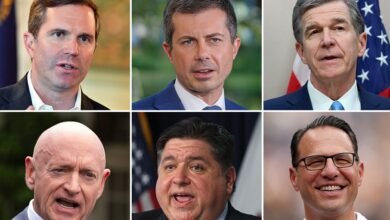Trump’s imaginary “unity” pivot was just another demand for loyalty

The second speech, which began immediately after the recitation of Saturday’s events, was classic Trump. He was talking over the audience, joking about his allies and bragging about his record. He went on too long and drained the energy of the crowd. It was a standard Trump campaign presentation with standard timing and standard campaign rhetoric.
News reports suggested that Trump’s acceptance speech would be something different. It would set a new tone, centered on a spirit of unity in the wake of the attack. “Getting shot in the face changes a man,” one Trump ally offered perceptively — ignoring that Trump’s wound was to the ear and that the aforementioned ally was former Fox News host Tucker Carlson. Trump, reflecting on his brush with death, would seek to bridge America’s deep political divides.
The day after the shooting, he made this observation on social media.
“At this moment, it is more important than ever that we stand together,” Trump wrote, “and show our True Character as Americans by remaining Strong and Determined, and not allowing Evil to Win.”
And then, two days later, he offered another thought that provided insight into his views on unity.
“The Radical Left Democrats are desperately trying to ‘Play the Referee’ by calling for an illegal and unconstitutional attack on our HOLY United States Supreme Court,” he wrote. “The reason these Communists are so disheartened is that their Illegitimate Witch Hunts are failing everywhere.”
Even before that less-than-unifying post, it was clear that Trump’s message of “unity” did not mean he was embracing an opportunity to rethink his divisive policies. It was, instead, a potential opportunity to absorb the sympathy Democrats were expressing at the time and use it to demand that they be kinder to him. He was not alone in this, either. Asked a tough question on Monday, Trump’s son, Donald Trump Jr., complained about the reporter’s insolence “even today, even 48 hours later,” as if the question were not about immigration but about restricting the gun used by the shooter.
Trump is not new to this. He has been seeking public office for nearly a decade. As such, he has a track record. He has called for unity more than once in the past. And each time he has done so, he has quickly made it clear that his vision of unity is that his opponents will stop criticizing him and start letting him do whatever he wants.
During his acceptance speech on Thursday, Trump made his promised call for unity — such as it was.
“We must not criminalize dissent or demonize political disagreement, which is what is happening in our country lately at a level no one has ever seen before,” Trump said. “In that spirit, the Democratic Party must immediately stop weaponizing the justice system and labeling its political opponent as an enemy of democracy.”
He stepped away from the pointer to add another point.
“Especially because that’s not true,” Trump added. “In fact, I’m the one saving democracy for the people of our country.” (He would later claim that the 2020 election was won through “cheating.”)
After mentioning this week’s (dubious) dismissal of the classified documents case against him, Trump demanded that his opponents leave him alone. You know, for the sake of unity.
“If Democrats want to unify our country, they should abandon these partisan witch hunts,” he said, “which I have endured for nearly eight years. And they should do so without delay and allow an election to proceed that is worthy of our people.”
Unity, then, means nothing more than the dropping of the criminal charges obtained against Trump for trying to overturn the 2020 presidential election, something that is not in the control of the “Democrats.” There has been no attempt to reach out to the other side, just Trump trying to win people over to his side.
There was not even an effort to reciprocate on the point. He criticized Democrats — and “crazy Nancy Pelosi” — for issuing subpoenas “because they are destroying our country.” He railed against America’s “failed and even incompetent leadership,” obviously referring to President Biden.
News reports seized on the claim that Trump was so far removed from partisan disputes that he wouldn’t even mention Biden’s name. Then Trump mentioned Biden’s name.
“I’ve said this often: If you took the 10 worst presidents in the history of the United States — think of the 10 worst combined — they would not have done the damage that Biden has done,” Trump said. Apparently then, remembering his promise, Trump promised he would not say the name again.
There was never any reason to take seriously the claims about Trump’s change in tone. “This is a chance to unite the whole country, even the whole world,” Trump told a sympathetic reporter, which wasn’t untrue. It’s just that Trump was clearly not interested or capable of doing so. If Trump wanted to be a unifying figure in American politics, he’s had plenty of opportunities over the past nine years to try.
An acceptance speech is not a normal political speech. It is a unique moment for a candidate to speak to Americans, to voters, and to explain why his candidacy is worth their support. To use inspiring language and create a memorable frame. Trump gave the same speech he always gives, with that slow, teleprompter-driven prologue about the assassination attempt.
The attempt on his life became another bargaining chip in another deal, weakened by the lack of evidence that the shooter was motivated by partisan animus. Trump flipped the coin anyway, demanding that his critics and prosecutors back down in recognition that something significant was different. But by leveraging the shooting as he did, he made clear that nothing was different.




